Imagine your entire bank fitting into your pocket and working 24 hours a day. And that never closes its doors! This is just the privilege of online banking. It was once an extravagance but is now a choice for millions worldwide. Indeed, the 2023 report from McKinsey states that more than 80% of banking customers worldwide currently prefer digital channels to in-person services.
The article considers why online banking counts in this financial world today, its basic advantages, how one should get along with safe online banking, and the future of digital finances. Whether you are planning to move to a new bank or are just curious, this guide will provide you with useful and current perspectives that will help you with online financial decisions.
Why Online Banking Has an Edge
The financial sector went digital, action-packed. From bill payments to cash loans, just about all actions in the bank are transacted online now. This is not just about convenience; it’s about access, efficiency, and control.
Here is why online banking is more than just a passing trend:
- Customer Expectations: People expect instant transactions, mobile access, and self-service options.
- Financial Inclusion: These days, digital banking is extending its services to marginalized communities and rural areas.
- Pandemic Acceleration: COVID-19 compelled banks to go digital and made customers embrace such changes.
- Cost Efficiency: Online banks operating without physical branches have comparatively lower overhead costs, and some of these cost savings are usually passed on to customers in the form of higher rates and lower fees.
Beneficial Payoffs of Online Banking
1. 24/7 Availability
Anytime, anywhere. Transfer money at midnight or check your account balance while the bank is always open for you.
2. Low Fees, Higher Earnings
Most of the online banks like Ally, Chime, and Varo offer higher interest rates on savings accounts and little to no monthly fees.
3. Faster Transactions
Instant money transfers and same-day bill payments with immediate transaction alerts keep you in control of your finances.
4. Simple and Intuitive User Experience
Applications like SoFi, Revolut, and Monzo provide users with dashboards that present spending insights and budgetary tools at a finger tap.
5. Stronger Security
Contrary to myth, online banking is most often a lot more secure than physical banking if used by applications of best practices–encryption, biometric logins, two-factor authentication, and fraud-alert mechanisms.
How to Get Started with Online Banking: Step-by-Step
Step 1. Choose a Bank
Decide whether you want a traditional bank offering digital services (like Chase or Wells Fargo) or a digital-only bank or neobank (say, N26, Axos, Current).
You should consider:
- FDIC or NCUA insurance
- Mobile app ratings
- Customer service reviews
- Features such as mobile check deposit, peer-to-peer transfers, and auto-saving
Step 2. Open an Account
Most online banks offer fast, fully digital onboarding processes. You will usually need:
- Something like your government-issued photo ID
- Social Security number or equivalent
- Proof of address
- Minimum deposit required to open the account (it may well be $0)
Step 3: Enable Mobile and Web Access
Download the official bank app and create the strongest login credentials possible. Verify that you have enabled:
- Biometric Authentication
- Real-time Notifications
- Two-Factor Authentication (2FA)
Step 4: Put in Some Money
Set up links to an account you already have, direct deposit, or depositing checks with mobile capture.
Step 5: Use the Tools
Explore:
- Budgeting insights
- Automated savings features
- Bill pay scheduling
- Investment tools or crypto access (some platforms like Robinhood and Cash App offer this)
Real-World Example: How Chime Reinvented Basic Banking
Chime, a U.S.-based digital bank, disrupted the industry by offering early direct deposit, no overdraft fees, and automatic savings. Within five years, it had grown to over 12 million users vast majority of whom had either consciously stayed away from or distrusted traditional banking systems.
All this focus on ease of use, complete transparency, and really good tech makes Chime the blueprint for how online banking can meet the needs of today’s customers without the thousand-pound “legacy” infrastructure.
Tips to Get the Most Out of Your Online Banking Experience
- Automate Everything: Set up recurring transfers to savings and automated bill payments to stay consistent and avoid late fees.
- Track Your Spending: Use your bank’s built-in expense categorization tools to spot wasteful habits.
- Link to Payment Apps: Connect your account with PayPal, Venmo, or Zelle for easy peer-to-peer transfers.
- Keep an Eye Out: Customize alerts to detect large transfers, low debits, or suspicious transactions.
- Back It Up: An Offline record of account numbers, contacts, and crucial settings is really important in case of outages or a blocked network.
Common Mistakes to Avoid
- Using Weak Passwords: Do not use simple combinations like “123456.” Use a password manager to save strong credentials.
- Not Updating: Do not miss any updates to your app to get the latest in security patches and features.
- Accessing Public Wi-Fi: Never log in through an unsecured network. If it is necessary, get a VPN.
- Being Phished: No bank mails or texts you for credentials. Always be sure before clicking anything.
What’s Next for Online Banking?
1. AI-Powered Financial Assistants
Banks deploy AI chatbots for instant support and machine-learning models to predict spending patterns.
2.Embedded Finance
Expect banking to be embedded as a service into non-financial platforms (for instance, “banking” through a ride-sharing or e-commerce app).
3. Crypto Integration
Banks such as Revolut and PayPal now offer crypto wallets and trading alongside the classical ones.
4. Open Banking
Thanks to regulations such as PSD2, users can perhaps now collect accounts into one app, thus giving them more choice relating to their data and money.
Conclusion: Banking Has Evolved- Have You?
Online banking was, until recently, a convenience, but now it has become a necessity for the modern financial life-and so do mobile banking apps, with technical people being more aware of such an urgent need. Empowering consumers or businesses to manage money efficiently, at any time, anywhere, and with the help of decent technical tools is what online banking offers.
Ready to make the switch or take your digital banking strategy to the next level? See the best online banks, compare features, and start automating your finances today. Subscribe to our newsletter for more expert insights, tools, and tips, and get in full control of your financial destiny.




